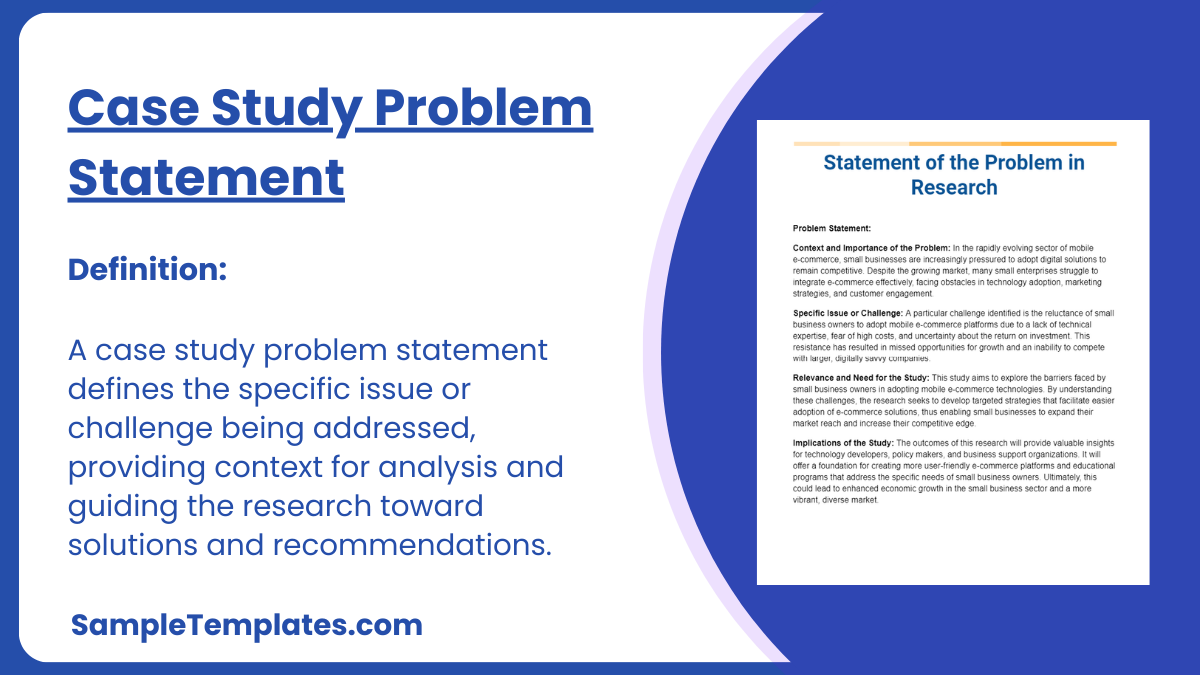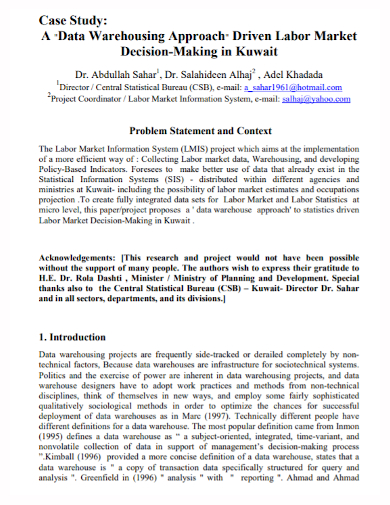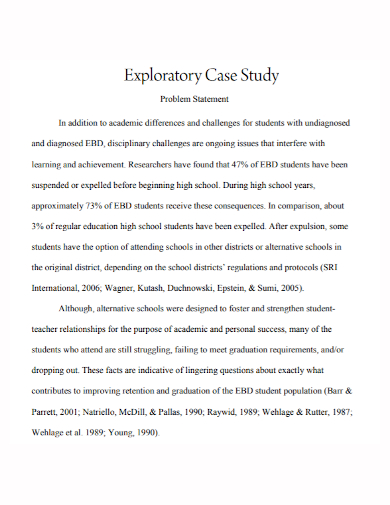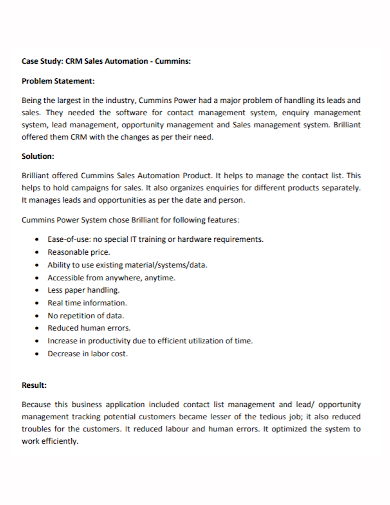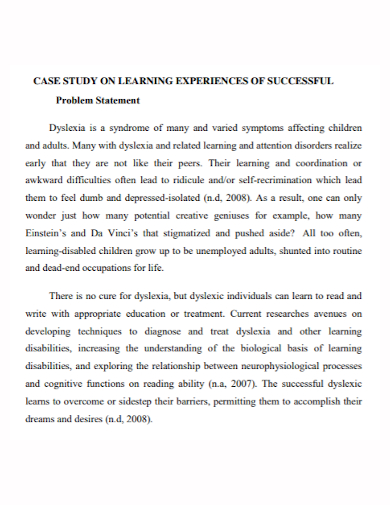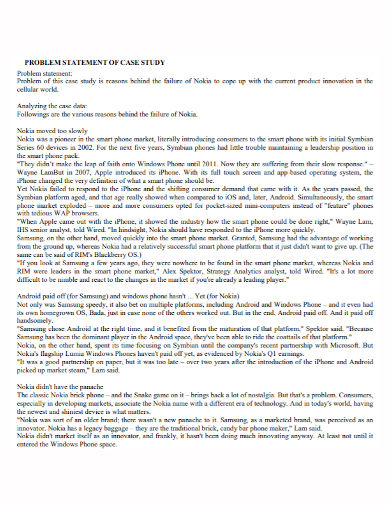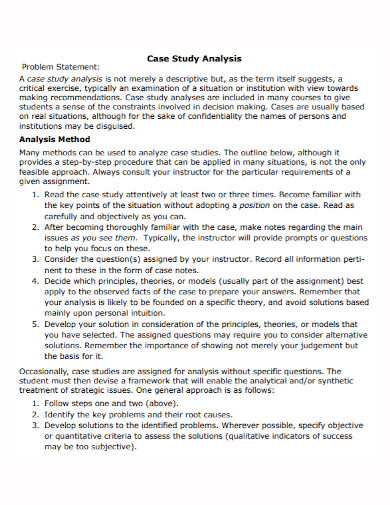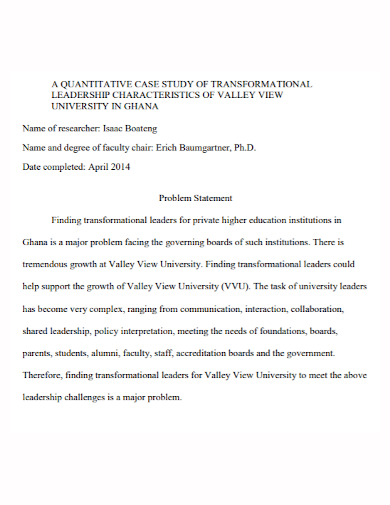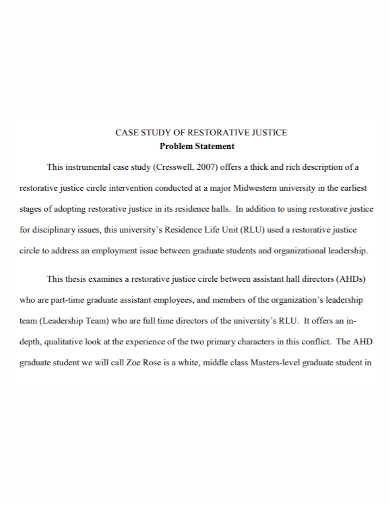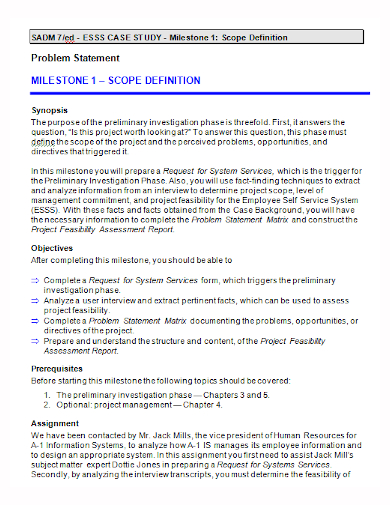A case study is an in-depth and specific study of a certain yet relevant person, group, or event. In a case study involving psychology and its related disciplines, nearly every aspect of the subject’s life and history is analyzed to understand the human mind through seeking and unveiling patters of behavior. This type of academic study can be used in a variety of fields including psychology, medicine, education, anthropology, political science, social science, law related studies, and social work. With the importance of this study, it is very much recommended to have this Case Study Problem Statement available anytime. In making this possible and convenient for the one that’s going to make all these problem statements, our site is offering you free, available, ready-made but very open to be customized templates that you can choose from. Just look into these templates throughout the article and choose the template that could help you achieve your problem statement goals.
For other problem statement template needs, our site also offers you templates like Graduate School Personal Statement, Subcontractor Statement, Freelance Statement, High School Statement, Interior Design Statement, Short Research Statement, Scientific Research Statement, Copyright Disclaimer Statement and more in the storage just for you and your convenience. Our article does not only give you utilizable templates that you can choose from, but also relevant and important information that you might want to consider as you go along with your project and its processes.
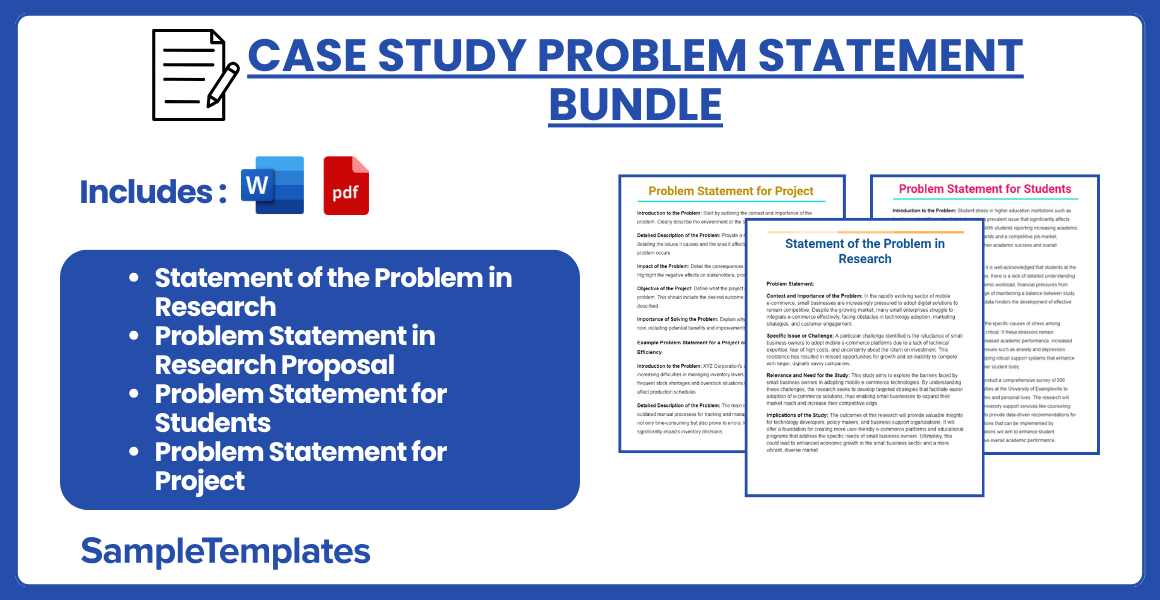
Download Case Study Problem Statement Bundle
Statement of the Problem in Research
Problem Statement:
Context and Importance of the Problem: In the rapidly evolving sector of mobile e-commerce, small businesses are increasingly pressured to adopt digital solutions to remain competitive. Despite the growing market, many small enterprises struggle to integrate e-commerce effectively, facing obstacles in technology adoption, marketing strategies, and customer engagement.
Specific Issue or Challenge: A particular challenge identified is the reluctance of small business owners to adopt mobile e-commerce platforms due to a lack of technical expertise, fear of high costs, and uncertainty about the return on investment. This resistance has resulted in missed opportunities for growth and an inability to compete with larger, digitally savvy companies.
Relevance and Need for the Study: This study aims to explore the barriers faced by small business owners in adopting mobile e-commerce technologies. By understanding these challenges, the research seeks to develop targeted strategies that facilitate easier adoption of e-commerce solutions, thus enabling small businesses to expand their market reach and increase their competitive edge.
Implications of the Study: The outcomes of this research will provide valuable insights for technology developers, policy makers, and business support organizations. It will offer a foundation for creating more user-friendly e-commerce platforms and educational programs that address the specific needs of small business owners. Ultimately, this could lead to enhanced economic growth in the small business sector and a more vibrant, diverse market.
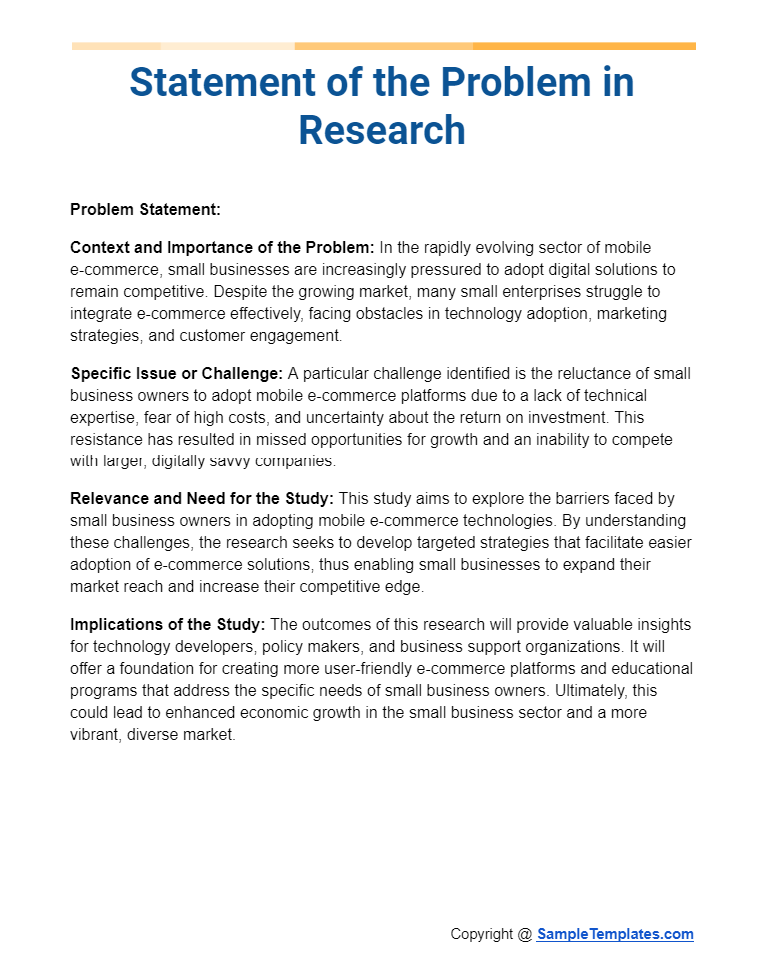
Problem Statement in Research Proposal
Introduction to the Problem: Start with a brief introduction that sets the context for the issue at hand, emphasizing the relevance and timeliness of the problem.
Identification of the Gap: Clearly identify the gap in the current knowledge or the specific problem that has not been adequately addressed by previous research.
Justification for the Study: Explain why it is important to address this gap or problem, detailing the potential impact of the research findings on the field, industry, or society.
Expected Outcomes: Outline what you aim to achieve by addressing this problem, suggesting how the research will contribute to the existing body of knowledge or practical applications.
Example Problem Statement for a Research Proposal
Introduction to the Problem: Recent advancements in renewable energy technologies have significantly lowered the costs of solar and wind energy. However, the integration of these intermittent energy sources into national grids remains a major challenge due to their variability and unpredictability.
Identification of the Gap: While considerable research has focused on technological improvements in solar panels and wind turbines, less attention has been paid to the development of efficient energy storage systems that can mitigate the intermittency issues and stabilize energy supply.
Justification for the Study: Addressing the efficiency and cost-effectiveness of energy storage systems is crucial for the wider adoption of renewable energy sources. Improved storage solutions will enable utilities to manage peak loads more effectively and enhance the reliability of renewable energy, contributing to national energy security and environmental sustainability.
Expected Outcomes: This research proposes to evaluate innovative chemical battery technologies that could significantly increase the storage capacity and discharge duration of energy storage systems at a reduced cost. The findings could drive further advancements in the renewable energy sector, influencing policy decisions and fostering a more sustainable energy future.
By following this structured approach, you can clearly articulate the problem your research aims to solve, making a compelling case for the significance of your proposed study.
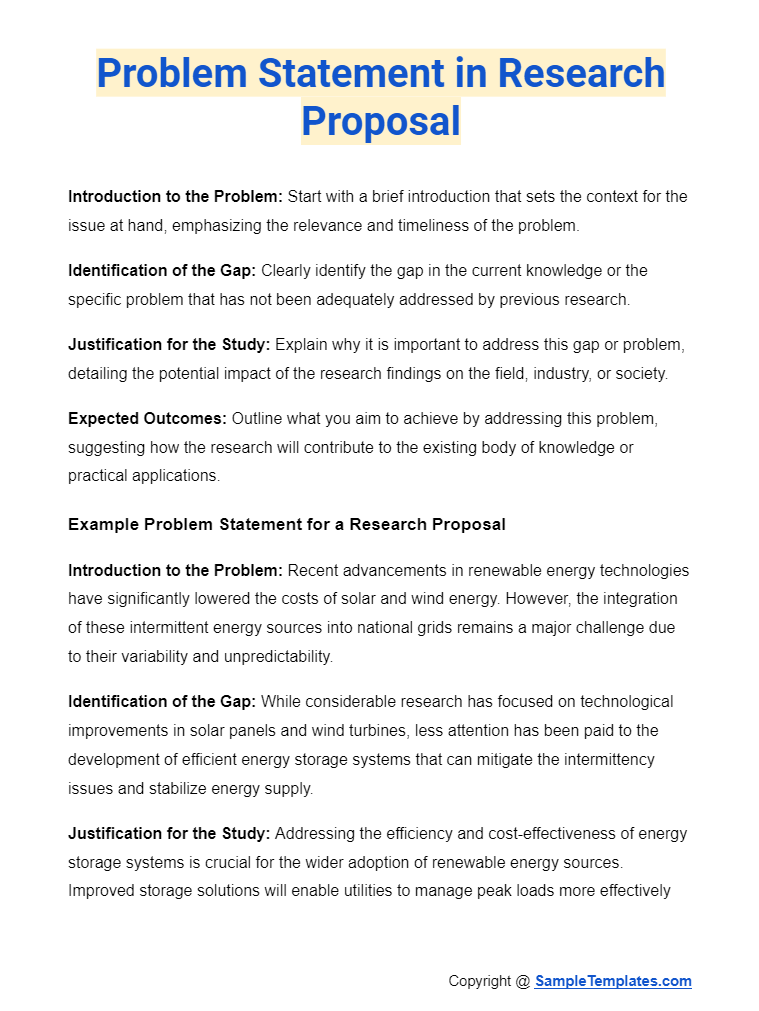
Problem Statement for Students
Introduction to the Problem: Student stress in higher education institutions such as the University of Exampleville has become a prevalent issue that significantly affects both learning outcomes and mental health. With students reporting increasing academic pressures due to advanced curriculum demands and a competitive job market, addressing stress is imperative to improve their academic success and overall well-being.
Identification of the Specific Issue: While it is well-acknowledged that students at the University of Exampleville face general stress, there is a lack of detailed understanding regarding the specific triggers such as academic workload, financial pressures from tuition fees and living costs, and the challenge of maintaining a balance between study, work, and personal life. This gap in specific data hinders the development of effective interventions tailored to their needs.
Justification for the Study: Research into the specific causes of stress among students at the University of Exampleville is critical. If these stressors remain unaddressed, students may experience decreased academic performance, increased dropout rates, and long-term psychological issues such as anxiety and depression. Addressing these issues is crucial for developing robust support systems that enhance educational outcomes and promote a healthier student body.
Expected Outcomes: This study aims to conduct a comprehensive survey of 500 undergraduate students across various faculties at the University of Exampleville to identify the primary stressors in their academic and personal lives. The research will also evaluate the effectiveness of existing university support services like counseling and financial aid. The expected outcome is to provide data-driven recommendations for more effective stress management interventions that can be implemented by educational institutions. These recommendations will aim to enhance student well-being, reduce dropout rates, and improve overall academic performance.
This structured approach ensures that the problem statement is clear, well-justified, and closely aligned with the specific needs and context of the students at the University of Exampleville, making a compelling case for the significance and urgency of the proposed study.
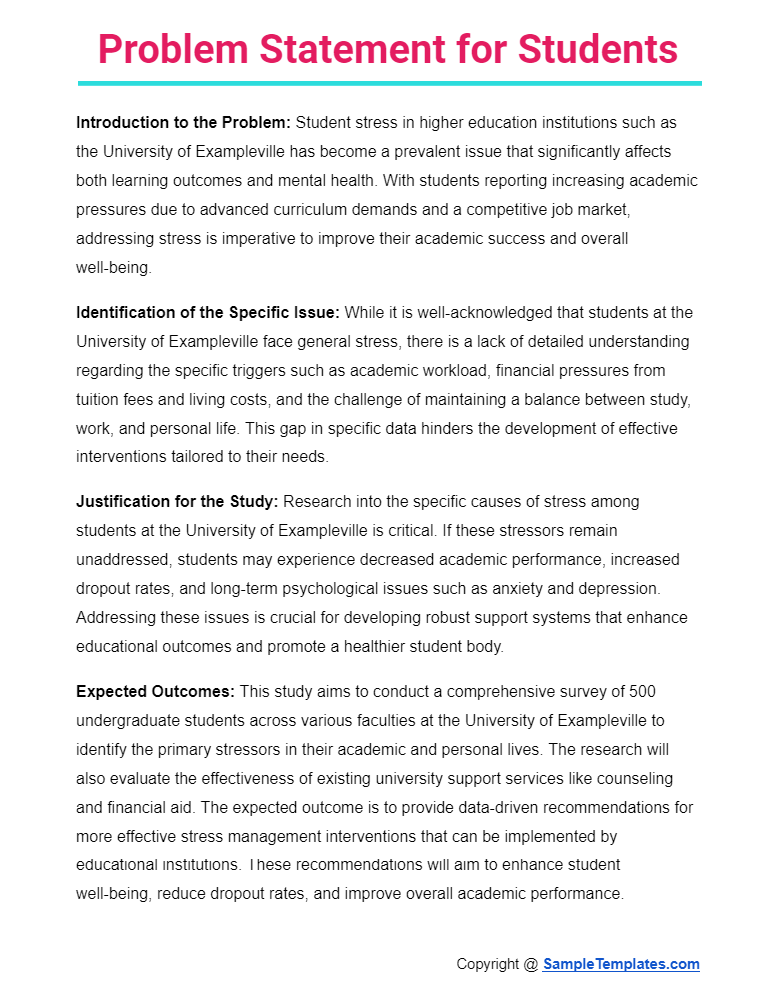
Problem Statement for Project
Introduction to the Problem: Start by outlining the context and importance of the problem. Clearly describe the environment or the system where the problem exists.
Detailed Description of the Problem: Provide a specific description of the problem, detailing the issues it causes and the area it affects. Be specific about how and why the problem occurs.
Impact of the Problem: Detail the consequences of the problem if it remains unsolved. Highlight the negative effects on stakeholders, processes, costs, or service levels.
Objective of the Project: Define what the project aims to achieve by addressing this problem. This should include the desired outcome and how it will resolve the issues described.
Importance of Solving the Problem: Explain why it is crucial to solve this problem now, including potential benefits and improvements once the problem is resolved.
Example Problem Statement for a Project on Improving Warehouse Efficiency
Introduction to the Problem: XYZ Corporation’s central warehouse has faced increasing difficulties in managing inventory levels efficiently. This has resulted in frequent stock shortages and overstock situations that disrupt the supply chain and affect production schedules.
Detailed Description of the Problem: The main issue lies in the warehouse’s use of outdated manual processes for tracking and managing inventory. These processes are not only time-consuming but also prone to errors, leading to incorrect stock data that significantly impacts inventory decisions.
Impact of the Problem: The inefficiencies in inventory management have led to an estimated loss of $500,000 annually due to wasted resources, missed sales opportunities due to stockouts, and additional costs from expedited shipping for necessary parts. Furthermore, the operational inefficiencies affect employee morale as workers struggle to meet performance benchmarks.
Objective of the Project: The project aims to implement an automated inventory management system that integrates real-time tracking technologies and predictive analytics. This system will accurately forecast inventory needs, optimize stock levels, and reduce human error.
Importance of Solving the Problem: Addressing this problem is crucial to enhancing operational efficiency and reducing costs. Implementing the new system will not only save the company money but also improve service levels and responsiveness in the supply chain. Moreover, it will enhance employee satisfaction by simplifying their tasks and enabling them to meet performance standards more easily.
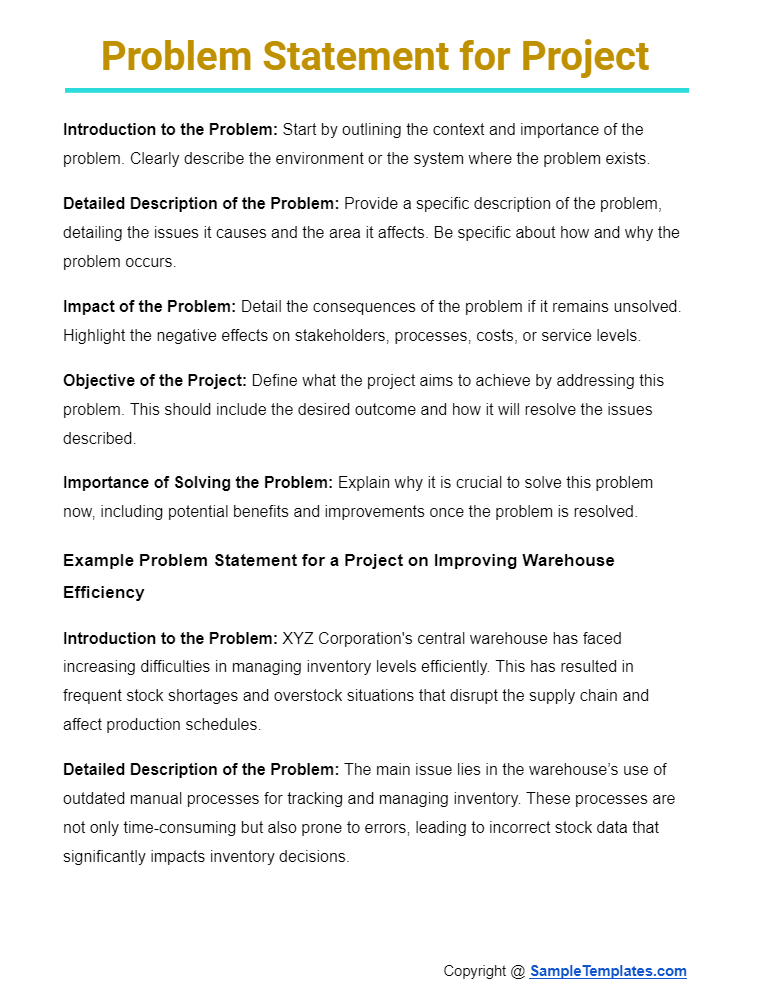
Browse More Templates On Case Study Problem Statement
1. Data Case Study Problem Statement
2. Exploratory Case Study Problem Statement
3. Case Study Development Problem Statement
How to Write a Case Study?
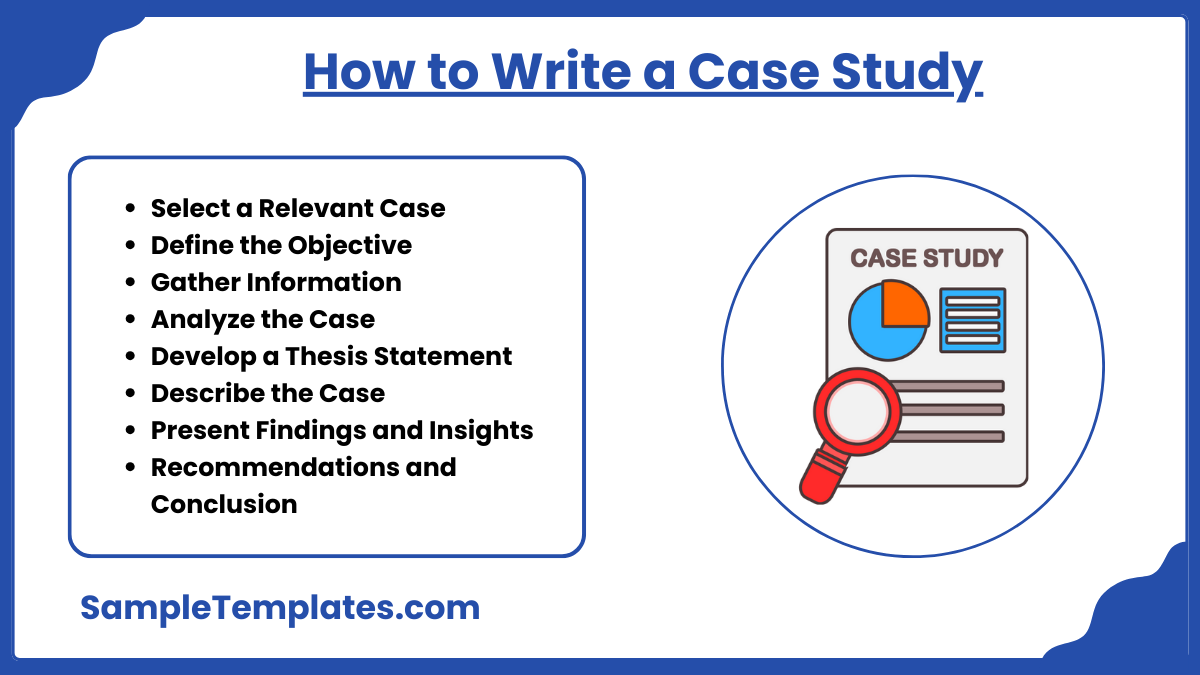
- Select a Relevant Case: Choose a case that is relevant to your field or subject area, which illustrates a specific problem, scenario, or situation. The case should be rich in detail and involve complexities that require analysis. You can also see more on Case Analysis Problem Statement.
- Define the Objective: Clearly state the objective of your case study. Are you trying to solve a problem, illustrate best practices, or provide insight into a process? Your objective will determine the focus of your analysis and the direction of your narrative.
- Gather Information: Collect as much data as possible about the case. This includes historical context, relevant facts, figures, and any other pertinent information. Sources can include interviews, documents, reports, and observations.
- Analyze the Case: Break down the information you’ve gathered to identify the core problems or opportunities. Look for patterns or underlying issues that explain the situation. This analysis should form the basis of your case study.
- Develop a Thesis Statement: Based on your analysis, craft a thesis statement that outlines the main conclusion or insight your case study will support. This statement should succinctly summarize the core outcome of your analysis.
- Describe the Case: Write a detailed description of the case, providing all necessary background information. Ensure that the reader understands the context and the significant factors that have influenced the scenario.
- Present Findings and Insights: Discuss the findings of your analysis, linking back to your thesis statement. Use evidence from your data to support your conclusions. Clearly articulate how these findings address the case study’s objectives. You can also see more on Business Problem Statement.
- Recommendations and Conclusion: Offer practical recommendations based on your findings. These should provide solutions to the issues identified or suggest further areas of research. Conclude your case study by summarizing the key points and reiterating the importance of the findings.
4. Case Study Sales Problem Statement
5. Dell Case Study Problem Statement
6. Sample Case Study Problem Statement
Tips for How to Write a Case Study?
- Choose a Compelling Topic: Select a case that is both interesting and relevant to your audience. It should address a specific problem, demonstrate a unique scenario, or highlight innovative solutions in your field.
- Define the Purpose: Clearly define the purpose of the case study. Are you looking to inform, persuade, or explore a complex issue? Understanding the purpose will guide your research and writing process. You can also see more on Management Problem Statement.
- Research Thoroughly: Conduct comprehensive research to gather all necessary information about the case. Use a variety of sources such as interviews, academic journals, reports, and first-hand observations to ensure a well-rounded approach.
- Use a Structured Format: Organize your case study into a clear, logical structure. Typically, this includes an introduction, background information, presentation of findings, analysis, and conclusion. This format helps maintain clarity and flow in your narrative.
- Focus on the Analysis: Spend ample time analyzing the problem at the core of your case study. Identify key issues and use theoretical frameworks or professional insights to dissect these issues. This analysis is crucial for the depth and credibility of your case study. You can also see more on Business Analysis Problem Statement.
- Incorporate Real Numbers: Use quantitative data to support your analysis and conclusions. Real numbers add credibility and a sense of scale to your case study, making it more persuasive.
- Highlight Key Takeaways: Clearly articulate the lessons learned or insights gained from the case study. Make sure these are easily identifiable for readers who may skim through your content.
- Edit and Revise: Never underestimate the power of revision. After writing your case study, take time to edit and refine it. Look for areas where you can improve clarity, strengthen arguments, and eliminate jargon that might confuse readers. You can also see more on Clinical Case Study.
7. Standard Case Study Problem Statement
8. Case Study Analysis Problem Statement
9. Qualitative Case Study Problem Statement
10. Restorative Case Study Problem Statement
11. Case Study Scope of Problem Statement
What is a Case Study?
The aim is that learning gained from studying one case can be generalized to many others, so putting it into simpler terms is the most effective way to achieve this goal. On the contrary, case studies tend to be highly subjective, specific, deep and it is sometimes difficult to generalize results to the larger population of common good. Case studies focus on a single individual or group cases, but somehow, they follow a format that is similar to other types of psychology writing. You can also see more on Proposal Problem Statement.
Benefits And Limitations
A case study can have both strengths and weaknesses, just like any other type of academic writing. Researchers must take into consideration these advantages and disadvantages before deciding if this type of study is appropriate for their needs. One of the greatest advantages of a case study is that it allows researchers to investigate, imagine and scrutinize that are often difficult to impossible to replicate or studied in a laboratory. Some other benefits of a case study that are important to be tackled with are:
- Makes it possible for researchers to collect a great deal of information
- Provide researchers the chance to gather or collect information on rare or unusual cases
- Allows the researchers to develop hypotheses that can be explored and studied in depth in experimental research
- Don’t need to be generalized to the larger population
- Cannot demonstrate cause and effect
- May not be scientifically rigorous
- Can lead to bias
Researchers may choose to perform a case study if they are interested in exploring a unique or revise and improvise, somehow develop a recently discovered phenomenon. The insights gained from such research can then help the researchers develop additional ideas, critical insights and generalizations and study questions that might then be explored in future studies. You can also see more on Marketing Problem Statement.
Types of Case Study
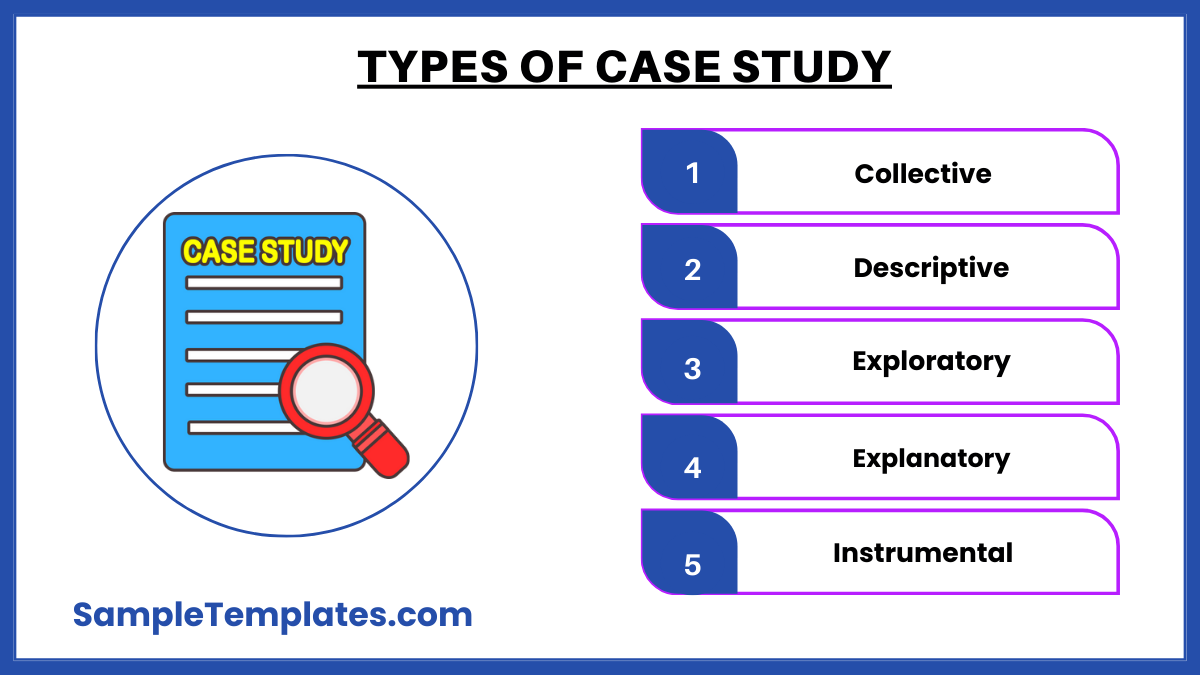
There are the many different types of case studies that psychologists and other researchers might use:
- Collective case studies: These talks about the studying of a group of individuals. Researchers might decide on studying a group of people in a certain setting or look at an entire community of people. You can also see more on Analytics Problem Statement.
- Descriptive case studies: These usually starts with a descriptive theory. The subjects or respondent’s statements should be well-observed and the information gathered is compared to the pre-existing theory.
- Explanatory case studies: These are often used to do causal case studies. In other words, researchers are interested in looking at factors that may have actually caused certain yet common everyday-life-things to occur.
- Exploratory case studies: These are sometimes used as a prelude and continue to further, more in-depth research. This allows researchers to gather more information first before then use it in developing their research questions and hypotheses. You can also see more on Written Case Study.
- Instrumental case studies: These happens when the individual or group allows researchers to understand more than what is initially obvious to observers, this is done through careful observations and focused group discussions.
- Intrinsic case studies: This type of case study is when the researcher has a personal motive or interest that he would like to answer by making the study. Jean Piaget’s deep and focused observations of his own children are great examples of how an intrinsic case study can contribute to the development of a psychological theory, further then becoming a great information that is spread to those who are practicing in the field.
FAQs
What exactly is a case study?
A case study is a research strategy and an empirical inquiry that investigates a phenomenon within its real-life context. Case studies are based on an in-depth investigation of a single individual, group or event to explore the causes of underlying principles. You can also see more on User Problem Statement.
When should you do a case study?
Understand how other companies have coped when faced with a challenging dilemma. Apply lessons learned from other organizations to your own company. Master and implement new ways of working. Obtain digestible information through brief but focused content. You can also see more on Quantitative Problem Statement.
You might find yourself getting difficulties in making the form or the project from scratch, as in zero. To help you in this matter, you are highly encouraged to avail the resources that are legally utilizable. Avail our great templates in SampleTemplates now!
Related Posts
FREE 10+ Medical Problem Statement Samples [ Surgical, Nursing, Management ]
FREE 10+ Payoff Statement Samples in PDF | DOC
FREE 10+ Scholarship Statement of Purpose Samples in PDF | DOC
FREE 10+ Engineering Problem Statement Samples [ Software, Mechanical, Civil ]
FREE 30+ Information Statement Samples in PDF | MS Word
FREE 50+ Policy Statement Samples in MS Word | Google Docs | PDF
FREE 50+ Summary Statement Samples in PDF | MS Word
FREE 10+ Nursing School Personal Statement in PDF
FREE 9+ Mortgage Statement Samples and Templates in PDF
FREE 10+ Independent Subcontractor Statement Samples in MS Word | Google Docs | Apple Pages | PDF
FREE 10+ Trust Distribution Statement Samples in PDF
FREE 14+ Compliance Statement Samples & Templates in PDF | MS Word
FREE 10+ Extension Impact Statement Samples in PDF | DOC
FREE 10+ Bank Reconciliation Statement Samples and Templates in PDF | MS Word
FREE 10+ Diversity Mission Statement Samples in MS Word | PDF
